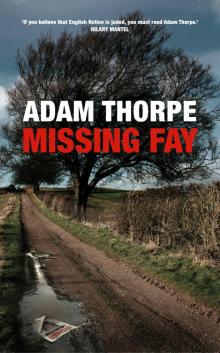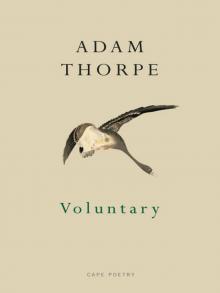- Home
- Adam Thorpe
Hodd Page 33
Hodd Read online
Page 33
282 Which goes on: ‘… neither shall the father bear the iniquity of the son’.
283 I leave the Latin untranslated. One of the most harmful and pernicious illusions of human history is the belief that there is something glorious in war – of whose sordid reality each generation must learn afresh at appalling cost, as if struck by an entirely preventable plague whose ghastly effects we forget within two or three decades.
284 ‘If you do not study you are slow in the service of God’ and ‘He made himself free’.
285 This remarkable account puts me in mind of a certain ‘French’ postcard (scant solace either to the poor poilu or to ‘Tommy’), that I acquired on active service in Flanders, picturing a banana and a pair of peaches under the heading ‘Les fruits préférés du soldat pour les petites manoeuvres’, with the following couplet beneath the latter fruit: ‘La pêche, ronde et duvetée / est gage de volupté.’ [This footnote crossed out in pencil by FB, with a scribbled note in margin: ‘Give us this day our daily CLAP.’]
286 Soughing (in even moderate gusts, the Scots pine makes a sound very like the sea’s surf).
287 Although percussit is the past of ferire.
288 Again, a virtual paraphrase of Bartholomew, VIJ, xxv.
289 In the ballad, the monk and his page are on their way to tell the king the good news; in this earlier and more down-to-earth account, they are merely returning home.
290 Presumably meant to be samples: merchants were already growing rich on England’s wool trade.
291 The question in the later ballad is, ‘Ffro whens come ye?’ [Pencilled double tick against this footnote, with ‘That is the question!’ in FB’s hand.]
292 As in MS: the sycamore not being a native tree (introduced only in the fifteenth century), either the harp was made on the Continent, or the wood was imported.
293 Compare the well-known lyric preserved in the Harley MS, beginning ‘Sumer is icumen in’.
294 Medieval ‘sinews’ are the same as modern ‘nerves’.
295 As in MS: ‘hotte’ means basket (from which the type for carrying bricks derives). The medieval mind delighted in even feeble puns, as readers of Chaucer will know.
296 See my Preface.
297 Compare the succinctness of the ballad’s version: ‘I layde furst hande hym apon.’
298 As in MS.
299 A traditional belief: the Virgin Mary herself was often symbolised as a tamer of unicorns, and her Son as entering like a unicorn into her womb.
300 Both literally and figuratively, serfs being landless slaves; as the distinction between serf and unfree villein became less and less, we find in them the direct descendant of the modern agricultural labourer.
301 This is quite untrue, of course: only in our own milder times has the habit of persuading youth through thrashing or belting seen an eclipse in favour of Montessori and other educational fashions.
302 Marginalia from the Scriptures, in red ink, possibly eighteenth century. ‘All things are naked and open unto the eyes of Him with Whom we have to do.’
303 This suggests that the author’s name finishes on a sibilant, like the monk’s own name of Thomas. Other common possibilities are Giles and Nicholas, though the latter is hardly ‘a single … stroke’.
304 There are many recorded instances throughout the Middle Ages of constables beheading murderers, traitors or robbers on the spot immediately after arrest – see, for instance, the fate of four among Sir Robert de Rideware’s band of ruffians, who had robbed some merchants of Lichfield in 1342 and were met by the bailiff and his men. The result then, however, was that the merchants lived in terror of the knights’ revenge (the interesting text of their legal petition is printed in Archaeological Journal, vol. iv, p. 69).
305 This seems an exaggerated term, given that during the thirteenth century a man (or indeed woman) could be hung for the theft of the value of fourpence.
306 This is true, as I can vouchsafe from my own late experience in the war. Pinned down for a full two nights behind a shattered embankment, cut off from help, with the severed head of my late comrade gazing upon me from a position it would have been suicidal to reach, my nerves suffered a blow from which they have yet fully to recover. [The last four words in proof double-underlined by FB, with ‘Adventure!’ scrawled in margin.]
307 As in MS: an Anglo-Norman legal term for a ‘runaway’, or ‘rover’. It specifically refers to serfs or unfree villeins who have left their lord or master without special licence, and might be recaptured at any time. It is doubtful, to my mind, that a young boy having just seen his foster-father beheaded would be articulate enough for such a calculated insult or the ensuing additions, but the narrator must needs put himself in the best light possible, and memory is ever a skilful fabricator. The later ballad is far more matter-of-fact and pitiless.
308 A tear in the parchment renders two lines illegible. This entire episode, covering three leaves in the original, suffers from wear and stains as if much read, like a favourite page in a child’s storybook – but remains unmarked by any later pen.
309 Although there is something faintly ridiculous, even comic, in this litany of insults, the final ‘son of a serf’ is a suitable trigger for the fatal attack, given the narrator’s sensitivity to his family’s perilous position just above that bottom, most servile class.
310 Numerous were the ancient mock-rituals and folk plays (often performed in May), that involved a beheading and a resurrection – symbolic of the death of winter and the entry of summer.
311 No doubt a reference to ars notoria, whereby books of spells and illicit learning are made.
312 i.e. false coin: coin-clippers were punished by savage mutilation or death.
313 It seems that, as both these incidents occur in Robin Hood and the Monk, the latter was an amalgam of two pre-existing ballads.
314 Alas, this choice verse or song does not survive; henbane, part of the nightshade family, was known for its power to attract women.
315 Possibly a reference to his ink, which in the Middle Ages was drawn from gall-apples (caused by wasps) on the bark of oaks, the acidic liquid being mixed with soot or iron salts to give it darkness, and with nut oil for body. ‘Gall’ (as in plain ‘bile’) is Latin fel.
316 As in MS: the robin – a delightful detail that spans the centuries.
317 Marginalia in Hand A: a quote from St Paul’s Epistle to the Romans (c. vii, v. 15). I have again adapted the Wycliffite translation.
318 Such amusements were not always secular: the Feast of Fools, which took place (mostly in France and Flanders) at the Festival of the Circumcision on 1 January, involved drunken clerics riding donkeys into church, dressing up as women, wearing monstrous masks, using obscene gestures and language, and generally running amok.
319 The text has post modestam senectutem nos habebit humus, etc.; but perhaps we should read molestam, and translate, ‘irksome old age, etc.’ – as in the popular thirteenth-century song, ‘Gaudeamus igitur’.
320 Probably meaning (as a sinister joke) that it had been ‘cut off close behind the ears’, as in the later heraldic term ‘caboshed’.
321 Although this shares elements with the plan in the later ballad – namely, the false use of papers, disguise and the overpowering of the porter – the outcome is quite different (and perhaps more realistic) in the present narrative.
322 Little John disguises himself as Reynolde Grenelefe in the fifteenth-century A Gest of Robyn Hode.
323 Herod’s exaggerated anger was a popular element in the mystery plays (e.g. the thirteenth-century Ordo Rachelis in the Fleury Play-Book, where Herod, furious at the Magi’s escape, attempts suicide).
324 As in MS: presumably ‘sheriff’, usually better spelt as ‘sheryff’ or ‘sceryf’.
325 It is not clear from the Latin whether (like Bartholomew), he feels blindness itself is the most wretched state, or the evil of faking it. Minstrelsy, of course, was the one possible occupation for the sightless, aided by
their powers of memory and sensitivity of hearing: as Mr Cecil Sharp notes (English Folk Song: Some Conclusions, 1907, p. 22): ‘A blind man, one Mr Henry Larcombe … from Haselbury Plucknett, sang me a Robin Hood ballad. The words consisted of eleven verses. These proved to be almost word for word the same as the corresponding stanzas of a much longer black-letter broadside preserved in the Bodleian Library.’
326 It is significant that he describes them, but makes no mention of visiting himself. The ‘Nunnery’ now resembles even more the kind of miserable Flanders bawdy-house familiar to participants in the late catastrophe.
327 Only in later times distinguished as a ‘slug’.
328 Medieval Latin, possibly a type of owl: we find the same curious term in Walter Map’s De Nugis Curialium (1180s–90s).
329 This revealing outburst shows again the increased intolerance towards ‘unnatural’ lust (whether in monasteries or without) during the thirteenth century, when it became linked to heretical activities.
330 My own grandfather remembered, as a small boy, being much impressed by a drunkard who, after two days in the stocks and entirely sobered, could only crawl out of the village. Flares on the salient would reveal to me humped sentries in forward positions who, after two nights of cold and hunger, crawled back similarly benumbed; yet these were guilty of no crime.
331 Honey was associated with God’s mercy.
332 That the robin is a fairweather bird remains a popular belief among country folk in our parts.
333 The part of an embattled wall between the embrasures.
334 This being served at five o’clock; dinner was at nine or ten in the morning.
335 The last mentioned shows how, compared to our own industrial age of steam and omnibus and motor car, the medieval period did not suffer from high levels of noise, unless one was a blacksmith or similar, or caught in a thunderstorm. Warfare in the age of armour would have seemed startlingly loud to our forefathers’ ears, however (especially after the introduction of gunpowder), but as nothing compared to the unimaginable, fantastical din of its present-day counterpart – which has left this participant, for one, with a perpetual thin shrilling in the ears.
336 ‘Thou shalt not kill.’
337 This seems again heavily indebted to Bartholomew or one of his sources.
338 A typically medieval humanisation of God, of whom the very least we expect these days is to control His temper; more likely, judging from recent events, He seems unable to control mankind, who periodically ceases his mischief only through exhaustion.
339 These being in lieu of money rent, a tenurial obligation of these feudal times that was much resented – as was the payment of various duties and taxes such as merchet, heriot, or the annual tallage.
340 The original has the incorrect in cantio aperti, where cantio [enchantment] is probably campi. This is a familiar diatribe against paganism on the part of Christianity, which has never resolved its relationship to the natural world’s fecundity and moral heedlessness.
341 The great hall was often, in the more old-fashioned manor-houses at this time, the only sleeping place (while the courtyard was that of a farm).
342 Most of Durham Cathedral was built between 1093 and 1133; the western towers between 1217 and 1226.
343 Such seigneurial gangs were a surprising feature of the thirteenth and fourteenth centuries.
344 The so-called Baron’s War during the reign of King John, a turbulence that had barely ended at this time.
345 They are not necessarily the offspring of serfs, however; the unfree tenant was equally trapped, as I have noted earlier: paying his lord in both labour services and ‘produce rent’, unable to sell his land, and devastated alike in time of failure. However, although lacking freedom and open to abuse, the feudal system’s self-supporting villages offered the security, stability and sense of ‘community’ that we have mostly lost under capital enterprise.
346 The Mediterranean or Babylon.
347 Such patterns being ‘woven with the design of the fabric, and not added afterwards as embroidery’ (A History of Everyday Things in England, M. & C. H. B. Quennel, 1918, p. 70).
348 i.e. embarked on a Crusade: possibly that of Richard the Lionheart in the 1190s.
349Volito, though volo is possibly meant: ‘to fly’ in the sense of ‘move rapidly’. The parchment has shrapnel damage on the borders of the leaves at this point, touching some of the words nearer the margin.
350 Although volva means the unqualified ‘womb’, it is usually a sow’s (to a knowledgeable Latinist); this being a favourite delicacy among the Romans. Otherwise the insult makes no sense.
351 Christina’s remarkable life of self-imposed hardship and miracle-working is found in the Gesta Abbatum S. Albani; she lived in the first half of the twelfth century.
352 Unlike the rest of Europe, torture was strictly prohibited in England except in cases of alleged treason; later in the century, in cases where the defendant refused to go before the jury, pressing with weights (peine forte et dure) was allowed as a subtle method of persuasion.
353 A freshman (also bejaunus) at a medieval university (from the French ‘bec-jaune’ or ‘greenhorn’).
354 It is sometimes a convenient conceit to depict the Middle Ages as barbaric, but this description suggests that at least in Europe, certain areas have indeed grown more civilised; prisoners in the late and intensely horrible conflict were relatively well treated, aside from plagues of cholera or individual punishments, and civilians, though suffering untold miseries and mass death, were mostly spared that direct cruelty of individual soldiers that has always marked an army’s passage. In what is now promisingly termed our ‘hundred years of peace’, it is possible to regard history as a story of progress, with intermittent spasms of violence that serve (perceptible only in hindsight) as creative spurs, however terrible their effects at the time. [‘This is nonsense! Nothing will bring back Alec!’ Scrawled comment in pencil by FB against this circled footnote.]
355 We know next to nothing about the medieval poor, as the records rarely mention them, though they made up a third of the population. This is a rare glimpse of an extra-mural ‘shanty’ town, that must at the time have been a commonplace.
356 This episode of the freeing of Hod is interestingly paralleled by the ballad in certain details: the gaoler stabbed right through ‘to the wall’; Little John taking ‘the keyes in honde’; and the final scaling of the fortification from the easier side (‘ther as the wallis were lowyst / Anon down can thei lepe’). Otherwise much is omitted.
357 More likely to have been due to his torn knee, infection being as dangerous then as it is now.
358 Testicle.
359 Presumably the vulture, familiar from the Crusades; according to Bartholomew, ‘when he ageth, his over bill waxeth long and crooked… and [he] dieth at the last for hunger’.
360 As in the MS.
361 This unpleasantly violent incident of deliberate disfigurement (indeed, the second in the narrative) is remarkably echoed in the ballad of Robin Hood and Guy of Gisborne[Child, 1888, 111. 91–4]. Appearing in print for the first time in the eighteenth century, the text cannot be dated yet preserves certain archaic features that suggest at least a late-medieval provenance.
362 Such anarchic, mystical beliefs, recurrent throughout the Middle Ages, survived remarkably intact among such groups as the seventeenth-century Ranters in England, and are even perceptible in our own day among certain eccentrics and charlatans. Such wild dreaming has as its core, however, an interesting rejection of the principle that God has delegated His decisions regarding sin to an earthly authority, the Church, along with the appropriate penalties; it also refuses to accept that earthly unhappiness is a means to happiness in the after-life – which equation does indeed come close to an acceptance of poverty and political injustice.
363 We have here an intimation of Iago’s bluff, perplexing character in Othello, three centuries later.
364 Two such incantations su
rvive in a twelfth-century medical MS of the British Museum (MS Harl., 1585, fol. 12a ff.), where ‘Earth’ is variously addressed as ‘Queen of the gods’, ‘Mother Earth’, ‘the Great Mother’, and ‘Holy Goddess Earth, parent of Nature, who dost generate all things, and regenerate the planet…’ These rare survivals are an indication that pockets of paganism were possibly far more widespread in the Middle Ages than is assumed – alas, dwindled these days (in England) to a belief in gossamer-winged fairies.
365 Ezekiel, xxiv, 3–11.
366 It is likely, we now think, that the earliest medieval ‘balades’ or ‘rimes’ were not so much sung as musically recited or chanted over the harp’s accompaniment, in the manner of a bard (such as in earlier times would have recited Homer’s poem). The Latin terms do not help us (cantus, etc.).
367 This passage, typically indebted to Bartholomew (Libra 111., Cap. xxij), reminds us of something known to the traditional reciters and singers of rhymes and ballads in our own times: that certain stylistic features make them easier to memorise. Additionally – at least in our local public house – the words are rarely identical with each performance, as Mr Cecil Sharp points out (English Folk Song, 1907, pp. 28–9), while admitting the exception of blind singers who have learned the words parrot-fashion.
368 Although he chooses not to remind us, both Henry and the retainer were ‘blond-haired’.
369 Nocturnal activities (beyond the emptying of latrines and so forth) were very few in the medieval period, and to be frowned upon or suspected as potentially criminal: most taverns closed at dusk.
370 Marginalia in the familiar and rather crude sixteenth-century Hand A, invading the left-hand column. ‘Amorous’ is meant in the bad sense [libidinosi].
371 i.e. 300 yards, the accepted maximum range of a longbow (though a crossbow might reach 500 yards) – as we know from records in its later heyday, matching present archery contests. I have myself witnessed such long flights in Regent’s Park before the war, in the strip belonging to the Royal Toxophilite Society, in the company of my late friend Alec Hoxforth, a most talented bowman.

 Missing Fay
Missing Fay Hodd
Hodd Pieces of Light
Pieces of Light The Standing Pool
The Standing Pool Ulverton
Ulverton Nine Lessons From the Dark
Nine Lessons From the Dark Flight
Flight The Rules of Perspective
The Rules of Perspective From the Neanderthal
From the Neanderthal Is This the Way You Said?
Is This the Way You Said? Still
Still No Telling
No Telling Voluntary
Voluntary Between Each Breath
Between Each Breath